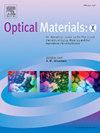Optical properties of SiO2 opal crystals decorated with silver nanoparticles
Q2 Engineering
引用次数: 0
Abstract
SiO2 opal crystals decorated with silver nanoparticles (AgNPs) have been successfully fabricated. SEM analysis revealed that the SiO2 opals have an ordered region of 25–30 μm2, and AgNPs are located into the gaps between the SiO2 nanospheres. The effect of the plasmons of AgNPs on the photoluminescence of SiO2 opal crystals were investigated. Under excitation of a 325 nm laser, we observed the quenching of the intrinsic defect emission in SiO2 as the concentration of AgNPs increased. The cause of the observed photoluminescence behavior is attributed to the interaction between surface plasmon induced by AgNPs and photoluminescence centers in SiO2 opal crystals. Then, we utilized SiO2 opals crystals decorated with AgNPs as a SERS substrate. The final enhancement factor of the Raman shift was 1.64 × 107, enabling the trace detection limit for a case of malachite green to be as low as 0.05 ppm, with a relative standard deviation of less than 1.75 %. This outcome suggests the potential for direct application of the prepared substrates in ultra-fast chemical analysis.
银纳米颗粒装饰的二氧化硅蛋白石晶体的光学特性
用银纳米粒子(AgNPs)装饰的二氧化硅蛋白石晶体已被成功制造出来。扫描电镜分析表明,二氧化硅蛋白石具有 25-30 μm2 的有序区域,AgNPs 位于二氧化硅纳米球之间的空隙中。研究了 AgNPs 的质子对 SiO2 蛋白石晶体光致发光的影响。在 325 纳米激光的激发下,我们观察到随着 AgNPs 浓度的增加,SiO2 的本征缺陷发射被淬灭。观察到的光致发光行为的原因是 AgNPs 诱导的表面等离子体与 SiO2 乳白晶体中的光致发光中心之间的相互作用。然后,我们利用装饰有 AgNPs 的二氧化硅蛋白石晶体作为 SERS 基底。拉曼位移的最终增强因子为 1.64 × 107,使孔雀石绿的痕量检测限低至 0.05 ppm,相对标准偏差小于 1.75 %。这一结果表明,制备的基底可直接用于超快速化学分析。
本文章由计算机程序翻译,如有差异,请以英文原文为准。
求助全文
约1分钟内获得全文
求助全文
来源期刊

Optical Materials: X
Engineering-Electrical and Electronic Engineering
CiteScore
3.30
自引率
0.00%
发文量
73
审稿时长
91 days
 求助内容:
求助内容: 应助结果提醒方式:
应助结果提醒方式:


